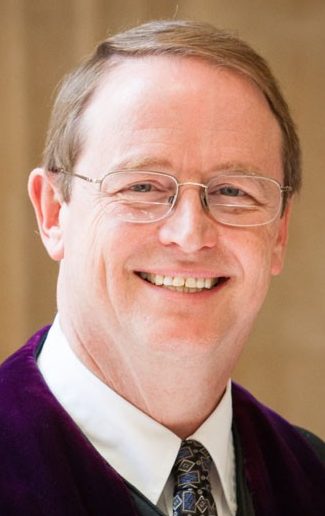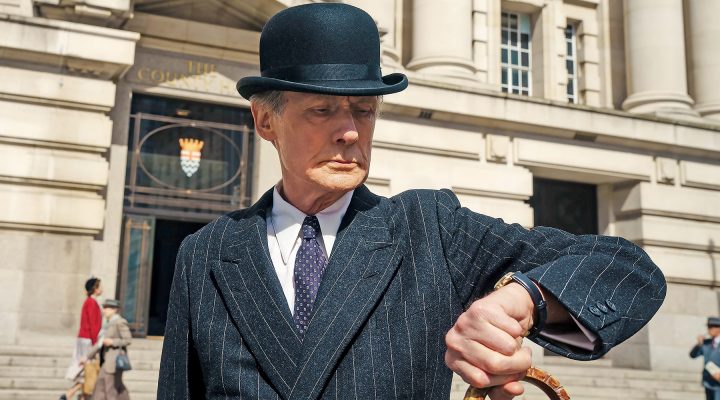Last week, we used our senior discounts to see a movie for grownups. Carol and I were 40% of the audience. The one other couple there was 20 years older than we are.
The ticket-taker apologized to them: “I’m so sorry. It’s upstairs.”
This intelligent couple knew to arrive 20 minutes early in case the movie was upstairs. Carol and I were right behind them. There also was a 12-year-old in the theater. I assume he came to see Cocaine Bear but could not pass for 17.

Brett Younger
Living has a score of 96 on Rotten Tomatoes, but only critics and seniors are going to see it. The movie stars Bill Nighy — not the science guy. Davy Jones in Pirates of the Caribbean and Billy Mack in Love Actually has been nominated for an Oscar for best actor in a leading role. Nighy is 74 but looks older. He plays Mr. Williams, a humorless civil servant in London in 1953. His stiff upper lip is concrete.
The movie has its origins in a Leo Tolstoy short story from 1886, The Death of Ivan Ilych. Tolstoy describes the tragedy of a boring life: “Ivan Ilych’s life had been most simple and most ordinary and therefore, most terrible.”
In 1952, the Japanese director Akira Kurosawa used Tolstoy’s story for the film Ikiru. Living, the British remake, is set in a county public works department — a world of bureaucracy, hierarchy and politeness in which workers move forms from one tray to another.
“We try not to have too much fun and laughter. It’s rather like church.”
“I hope to make a difference,” says a new employee on his first day in the frosty office.
Williams responds, “We try not to have too much fun and laughter. It’s rather like church.”
Williams is trapped in his routine. His son references his father’s “shell of an existence.” One colleague nicknames him “Mr. Zombie.”
We know this story. We know what it means to accept things as they are in return for a paycheck.
A poem painted on the ceiling of the tunnel connecting the Port Authority and Times Square subway stops reads:
Overslept
So tired
If late
Get fired
Why bother?
Why the pain?
Just go home
Do it again
We have felt like cogs in the machine. We spend days without really seeing, hearing or feeling anything. A familiar coat of apathy covers everything. Talking to friends becomes checking our email. Reading a great novel becomes reading recipes on Facebook. The songs we used to sing become background music.
The casual way we accept apathy is scary. Playing with our daughter becomes watching our daughter play. Listening becomes waiting for our turn to speak. Compassionate concern becomes pretending to be concerned.
The ways in which we give in to apathy should frighten us. Worshipping God becomes critiquing worship. Praying becomes making a to-do list. Caring for the poor becomes being in favor of caring for the poor.
“We choose apathy by filling our days with busyness.”
We choose apathy by filling our days with busyness. We have so much to do and so little time to do it. The result is dull and ordinary. We are victims of our routines.
Williams disrupts his routine by leaving the office early to go to the doctor’s office. He learns the cancer has spread and he has six months to live. He does not tell his son or daughter-in-law. If you met her, you would understand why.
He withdraws half his life savings, buys sleeping pills, and goes to a seaside resort with plans to take his life. He meets a writer who thinks Williams needs a round of wine, women and song. This seems like a good idea for 10 minutes.
Williams returns to London, but not to work. He goes to lunch with a former colleague, whose passion for life he envies. He tries to remember what it is to be alive, telling her: “I didn’t notice what I was becoming. I would like to be alive for one day, but I realize I don’t know how.”
He needs to do something good before he dies. He goes back to work and forces his co-workers to follow through on a plan for a playground that has been bogged down in paperwork. He fights the bureaucracy, pushes the process and stands up to his superiors. Just before he dies, Williams watches children play in the finished playground.
When Mr. Williams dies, parents of small children show up at his funeral. The man they knew for his last six months has little in common with the person co-workers knew for decades. These parents knew him after he had given up apathy to make room for compassion.
“We have to fight apathy in order to make a difference.”
Each one of us can make a contribution, but we have to work at it. We have to fight apathy in order to make a difference. We can improve the lives of those around us. We can be parents who parent, teachers who teach, students who learn, writers who write and painters who paint.
Ray Bradbury says: “Stuff your eyes with wonder. Live as if you’d drop dead in 10 seconds. See the world. It’s more fantastic than any dream made or paid for in factories.”
We can be deeply good. We can listen well. We can make others feel funny and valued. We can be grateful. We can do wonderful work. We can live with a generous spirit.
We can envision more. We can learn. We can expect more. We can surprise ourselves. We can face the unknown. We can truly live.
Brett Younger serves as senior minister at Plymouth Church in Brooklyn, N.Y.
Related articles:
Five tips from the dead about living life in the new year | Opinion by Mark Wingfield
‘Will it come like this, the moment of my death?’ Living and dying in a COVID-19 world | Opinion by Bill Leonard


